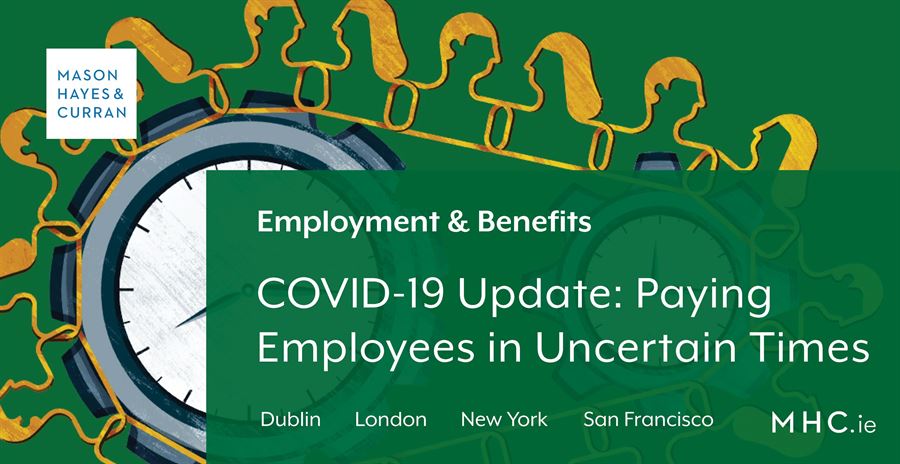
The Irish Government recently announced that, where possible, businesses should encourage home working. The Government also announced that schools, crèches and colleges would close with more or less immediate effect and remain closed until at least 30 March.
At the moment shops and other businesses remain open, although there is growing speculation that more drastic measures may be taken in the coming days, which could result in Ireland taking steps similar to many of our EU counterparts.
For employers this raises lots of difficult questions – particularly around their obligation to pay employees. Here, we look at an employer’s obligation to pay employees where it is no longer in a position to provide employees with their normal contractual hours as a result of the COVID-19 crisis.
The rule, or the exception?
Where employees can work from home, they should be paid as normal. However, for many, working from home is not a possibility either (1) due to the nature of their job; or (2) government enforced/recommended closure. In addition, due to the restricted movement of people many businesses have seen a dramatic reduction in business, and consequently they have no option but to reduce their employees’ hours or, worse, shut their doors for the foreseeable future.
Paying your employees during the crisis
We provide an overview of the legal position for the payment of employees during this crisis. The table will be subject to the specific employee’s terms and conditions of employment.
Key:
- € - entitled to be paid
- X – no entitlement to be paid
- S – entitlement to sick pay (where applicable)
Scenario |
Can Work From Home |
Can’t Work From Home |
|---|---|---|
Employee requests to self-isolate |
€ |
X |
Employer request to self-isolate |
€ |
€ |
HSE/Dr recommended self-isolate |
€ |
S |
Employee temporary lay-off (insufficient work) |
€ - unless the contract provides for lay-off* |
€ - unless the contract provides for lay-off* |
Employer voluntary shut down |
€ |
€ - unless the contract provides for lay-off* |
Government forced shut down |
€ |
€ - unless the contract provides for lay-off* |
Certified absence (during normal business hours) |
S** |
S** |
* Even though the general legal position that an employee is entitled to continue to be paid during lay-off unless the employment contract provides for lay-off, there is a reasonable basis to argue that an employer may be permitted to lay off employees without pay, in exceptional circumstances. A partial or full closure of a business due to COVID-19 may also constitute exceptional circumstances to justify lay-off without pay. In such (exceptional) circumstances, if an employee who is placed on unpaid lay-off was to bring a claim for unpaid wages / breach of contract, it is our view that it is unlikely that a substantial award, if any, would be made.
On 15 March, the Government announced the introduction of a new COVID-19 Pandemic Unemployment Payment. This new payment is available to all employees who have “lost employment” and have no work.
This payment, in our view, indicates an acknowledgement by the government that regardless of the wording of the contract of employment, many employers may not (or may not be able to) continue to pay employees during the period of closure or reduced hours.
Employers have been asked to “operate” the COVID-19 Pandemic Unemployment Payment scheme for the government by paying employees the €203 per week. The amounts paid to employees and notified to Revenue will then be transferred back to the employer by Revenue.
** Employees will be entitled to €305 Illness Benefit from the State per week for up to two weeks if they are medically required to self-isolate, or for the duration of their medically-certified absence from work with a COVID-19 diagnosis. Employees will be entitled to Illness Benefit from the start of their absence and the normal “6 day waiting period” has been abandoned in these circumstances. For sick leave that is not directly related to COVID-19, the normal Illness Benefit rules apply. The Employee may also be entitled to contractual sick pay.
Conclusion
This situation is unprecedented in living memory and we are in uncharted territory. Employers should, where possible, be as flexible and reasonable as possible and consider offering employees alternative forms of leave during the crisis. This could include employees taking some of their accrued annual leave, for example.
If you would like to discuss the potential impact of this issue on your business, please contact a member of our Employment & Benefits team.
The content of this article is provided for information purposes only and does not constitute legal or other advice.
Share this:






